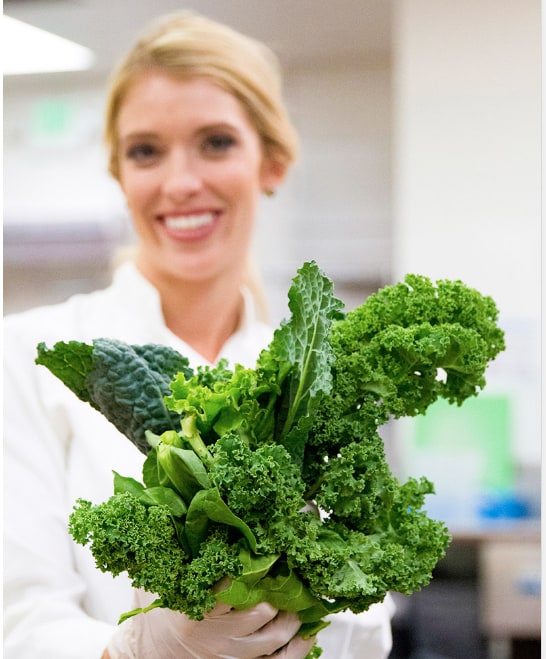
Plant-based burgers are having a moment. It seems that every time I hit the supermarket, there’s a new veggie burger brand. Even food-industry giants like Tyson Foods, Cargill, Nestle and Perdue Farms are having veggie burger FOMO. They’re hopping on the plant-based burger wagon, launching meat-substitute products.
But is this a good thing?
Before I answer that question, I reviewed the ingredients list i seven of the most popular brands of plant-based burgers. Here’s what I found:
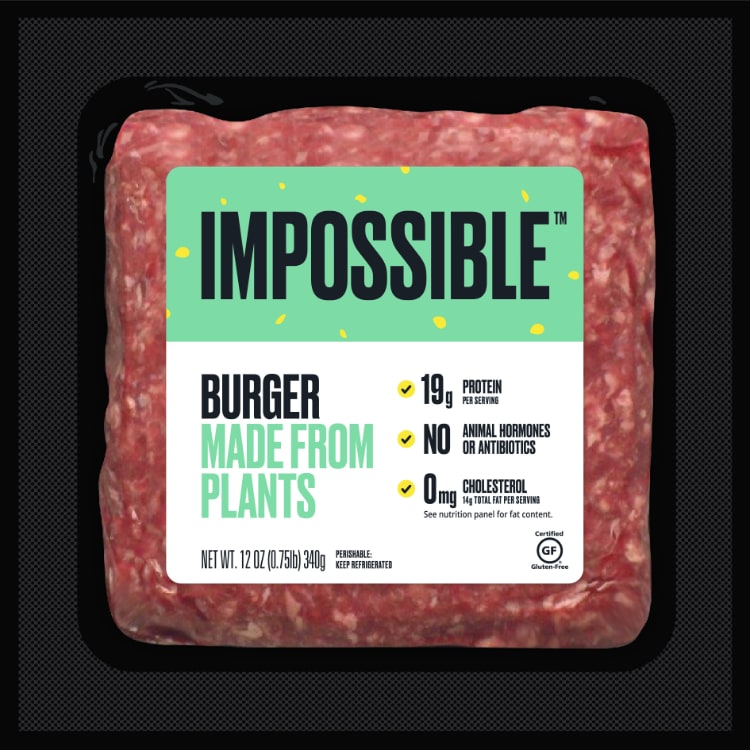
Impossible Burger
Along with Beyond Burger (listed below), Impossible Brands’ Impossible Burger has fueled the plant-based burger revolution. I wrote extensively about the Impossible Burger in a previous post. I’ll sum up what I wrote: Probably the best-tasting plant-based burger on the market. There’s a good reason why Burger King chose it for its wildly-successful Impossible Whopper. It looks just like a meat burger, drips blood-red juice just like a real burger and tastes pretty much like a beef patty. What’s not to love?
The bad news is that it contains two highly-processed forms of soy, one of which is a new genetically-modified version called Soy Leghemoglobin (“Heme” for short).
I’ve had a couple friends tell me that after eating an Impossible Burger, their next trip to the bathroom did not go well. Plus bad cramping.
Could it be that because Heme is basically new to human stomachs, our bodies don’t know how to react to it? Could it be that in some people, Impossible Burgers can trigger autoimmune reactions?
Time will only tell. I’m all for eating plant-based REAL food, but a soy that’s been grown in a lab? I don’t care how much it tastes just like the real thing, I’d rather eat a 100% grass-fed burger once a year that’s sourced from an organic, small family farm.
And one more concerning thing about the Impossible Burger: it’s made with coconut oil. The problem with coconut oil is that saturated fat comprises up to 90% of the total fat. For some people with a family of heart disease, coconut oil could be a ticking time bomb. (If you eat a lot of coconut oil, get your cholesterol levels checked once a year.)
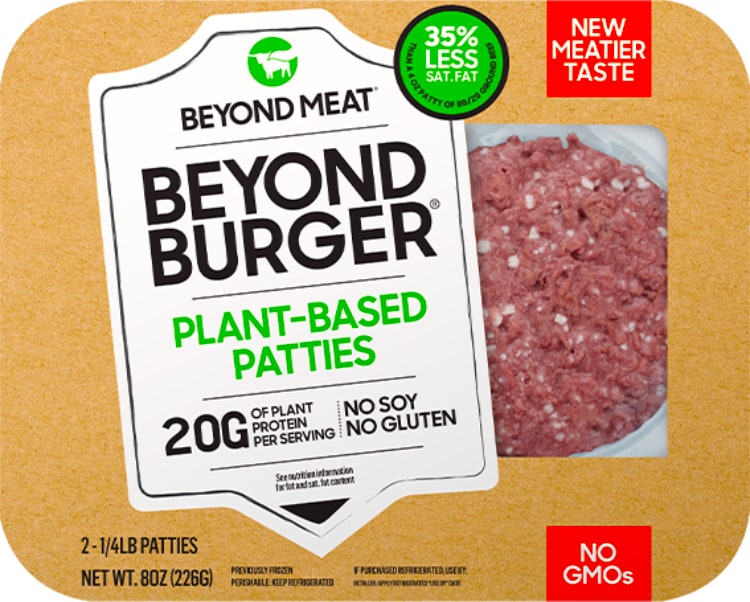
Beyond Burger
Like Impossible Brands, Beyond Meat, maker of Beyond Burger, has scored some fat paychecks in the form of venture capital. Bill Gates invests in Beyond Meat (he also invested $50 million in Impossible Brands) and that huge seed funding (no pun intended) is the reason why Beyond Burgers can be found in virtually every single supermarket in the country.
Beyond Burger claims to be GMO-free. So that’s a good start. It also tastes similar to the Impossible Burger. So if I had to choose between these two fake meat giants, I’d go with Beyond, based simply on the fact the company does not use soy heme.
For proteins, instead of soy, Beyond uses pea protein isolate, beans and brown rice. Pretty good so far. According to the American Institute for Cancer Research, pea protein isolate does not contain whole pea’s carbohydrate compounds that can support anti-inflammatory gut bacteria. But let’s not split hairs (or peas), because when you’re craving a burger, you know you’re not exactly eating a salad between two buns.
A couple things to watch out for: Beyond Meat also uses coconut oil as well as canola oil. I’m not crazy about canola oil. But again, when you want to sink your teeth into some fake meat, every once in a while, it won’t kill you. At least the canola oil is expeller-pressed, which means no harsh chemicals like hexane are used to extract the oil from the rapeseed plant. (Yes, canola oil comes from the rapeseed plant but don’t let that name spoil your appetite.)
I also like the fact Beyond uses beet extract to make its burger appear blood-red, unlike the lab-produced soy heme of the Impossible Burger.
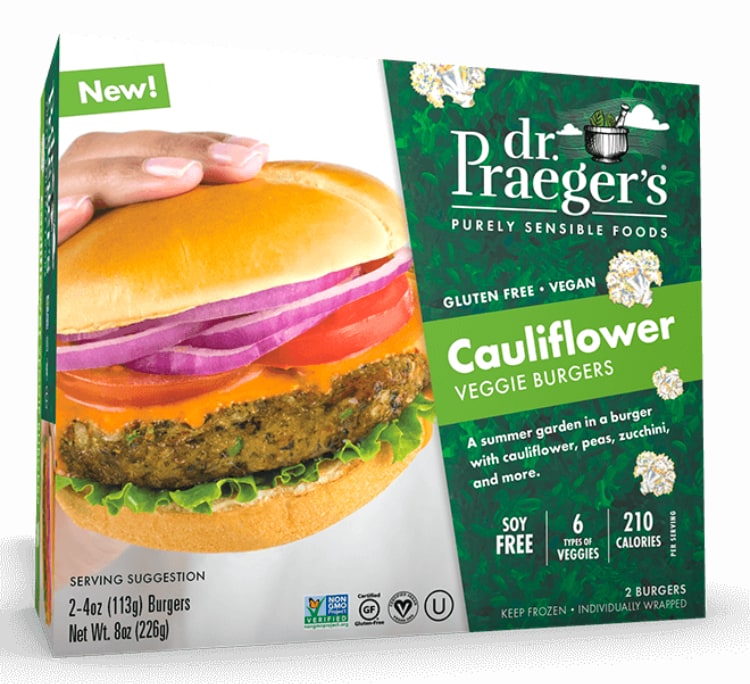
Dr. Prager’s California Veggie Burger
The godfather of the plant-based burger world, Dr. Prager’s California Veggie Burger hit the shelves in 1996. Fun fact: The brand was launched by a heart surgeon, Peter Prager, who died in 2012 at the age of 66. But don’t let his early death cloud your judgement of the California Burger. His obituary hinted his death could have been caused by prostate cancer.
Anyhoo, how does this relatively ancient brand of fake burger compare to Impossible and Beyond? In terms of taste, there’s no comparison. Dr. Prager’s tastes nothing like a real burger. But nutritionally speaking, I think it’s one of the most superior ones.
The ingredients list is not perfect. There are two ingredients I’m not thrilled about. Can you guess which ones they are in the list?
Carrots, Onions, String Beans, Oat Bran, Soybeans, Zucchini, Expeller Pressed Canola Oil, Peas, Broccoli, Corn, Soy Flour, Spinach, Red Peppers, Arrowroot Powder, Corn Starch, Garlic, Corn Meal, Sea Salt, Parsley, Black Pepper.
I already mentioned I’m not crazy about canola oil. But that’s how veggie burgers can stay relatively inexpensive. If they used avocado oil, each patty would cost a buck or two more probably. The two other ingredients that as a certified nutritional therapist bother me somewhat are soy flour and cornstarch. Soy can drive estrogen levels too high in younger women. It’s also one of the most common triggers of food allergies. As for cornstarch, while it’s a great ingredient for body powder, it’s basically just high-glycemic sugar. But all in all this is one of the best, ingredients-wise.
But the texture of Dr. Prager’s and almost every fake burger is crumbly. You definitely don’t get that true burger experience. So what I do is rather than eat it as a true burger, I chop it into pieces and top it on a whole grain or salad for a filling meal.
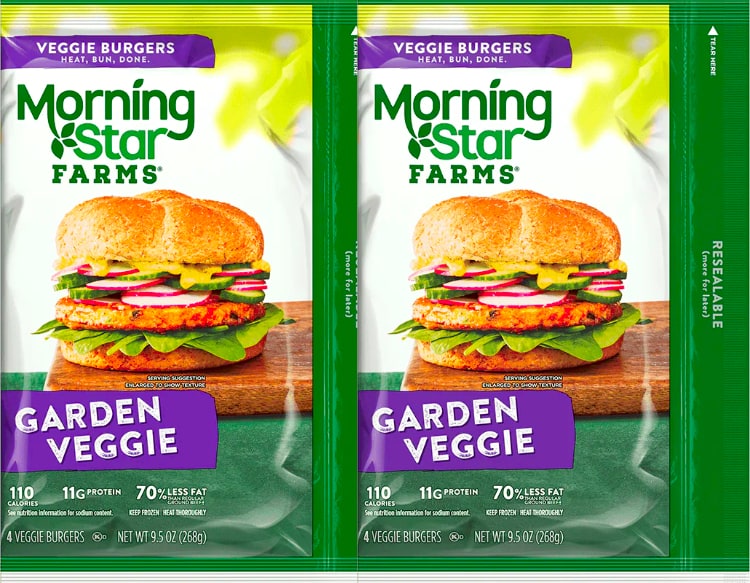
MorningStar Farms Garden Veggie Burger
If Dr. Praeger’s is the godfather of fake meat, MorningStar is the great grandfather. It hit the shelves in 1975. Even I wasn’t born then, haha!
Let’s jump right into the ingredients:
Water, carrots, onions, soy flour, egg whites, mushrooms, whole grain oats, wheat gluten, water chestnuts, vegetable oil (corn, canola, and/or sunflower oil), green bell peppers, calcium caseinate (from milk), cooked brown rice (water, brown rice), red bell peppers.
Good stuff, except for the same soy problem? There’s more bad news I’m afraid. Vegetable oils are terrible for your health. They are a major contributing factor to inflammatory-related diseases. Also, oats are a major source of glyphosate residue. Glyphosate is a herbicide used in the weed killer, Roundup. It’s been blamed for causing cancer in more than 125,000 lawsuits.
Considering the crumbly end-product and the fact that it’s nowhere-near-close to tasting like the real thing, I’ll pass.
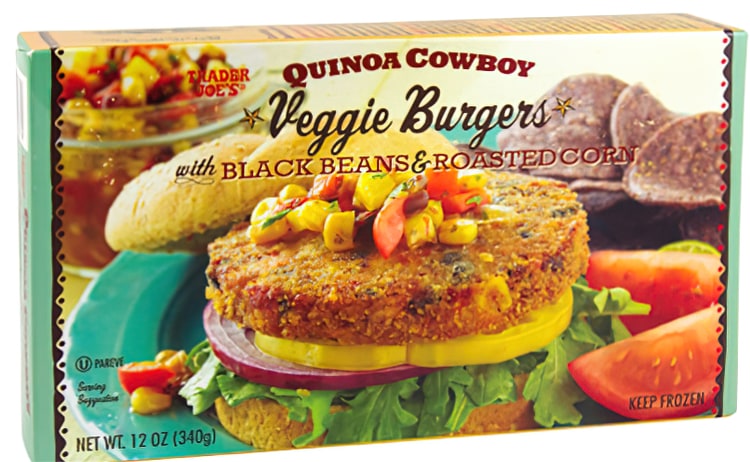
Trader Joe’s Quinoa Cowboy Burger
I love the vibe at Trader Joe’s. But do I love sinking my teeth into a quinoa burger? Once in a blue moon, I do. I like the fact that it contains 13% of the daily recommended value of vitamin A. And it’s also a great source of fiber (6 grams; 24% DV).
Here’s the ingredients list:
Cooked tri color quinoa (tri blend quinoa, water), red peppers, cooked black beans (black beans, water), bread crumbs (wheat flour, sugar, yeast, salt), expeller pressed canola oil, roasted corn, onions, potato flakes, arrowroot, tomatoes, olive oil, jalapeno peppers, tomato paste, egg white powder, roasted garlic, white vinegar, salt, cilantro, chili powder (chili pepper, salt, garlic, cumin, spices), onion powder, coriander, black pepper, garlic powder, chipotle powder, lime juice powder.
Pretty much all good stuff. Just cook it much longer than the instructions say. And if it falls apart, who cares, it still tastes good in my opinion.
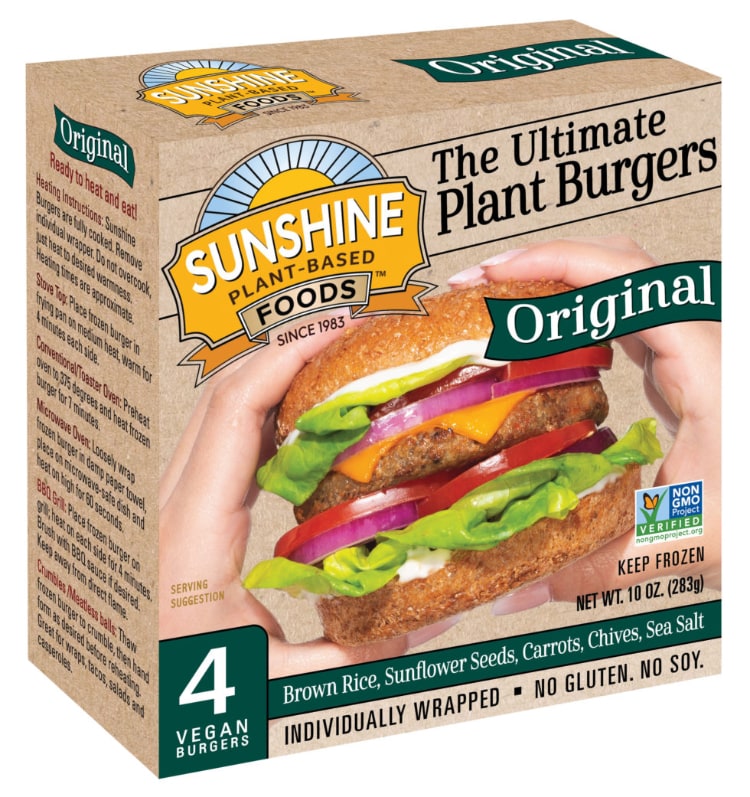
Sunshine Burger
I admit to as of yet not having tried this Wisconsin-based brand, but I do love the ingredients of their garden herb alternative meat patty:
Organic cooked brown rice, organic ground raw sunflower seeds, organic carrots, organic chives, sea salt.
Simple, organic, real-food ingredients. It’s on my list to try…
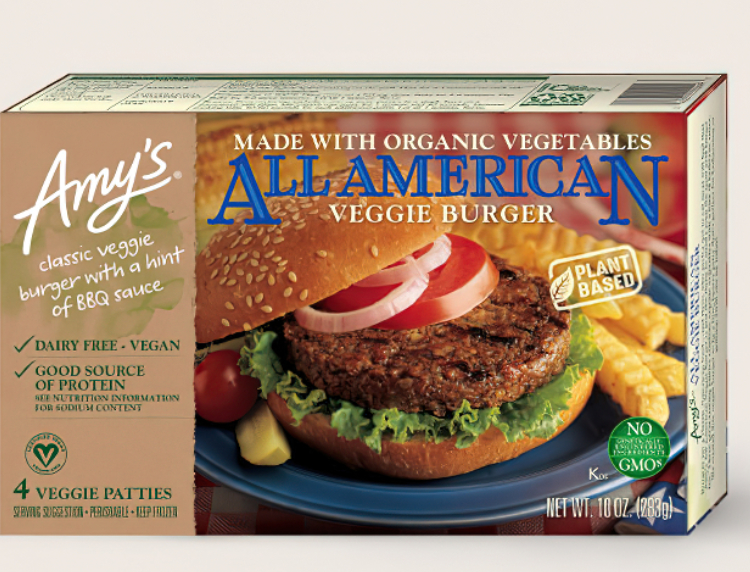
Amy’s All-American Veggie Burger
I used to love Amy’s veggie burritos back in the day. But I’m not all too crazy about the veggie burgers, mostly because of the soy issue. Here’s the list of ingredients:
Textured soy protein, organic onions, organic soy fiber, organic mushrooms, organic bulgur wheat, wheat gluten, filtered water, organic celery, organic carrots, organic walnuts, organic oats, organic bell peppers, expeller pressed high oleic safflower and/or sunflower oil, organic sweet rice flour, sea salt, organic potatoes, spices, organic tomato purée, organic cane sugar, organic garlic, organic apple cider vinegar, organic blackstrap molasses, stoneground mustard (distilled vinegar, water, ground mustard seeds, salt, spices), hickory smoke flavor, black pepper, clove oil.
Again, mostly good stuff, but all it takes is a few bad apples to spoil the bunch. Besides the soy protein and soy fiber, I don’t like the wheat gluten or the vegetable oils.
But again, if you like the flavor of it and it’s a once in a while treat, go for it.
Best Plant-Based Burgers: Conclusion
I’m not going to tell you which plant-based burger I think is best. Now you’re armed with the nutrition facts. Plus, taste is such a subjective thing. What I can tell you is that plant-based burgers are most often not the healthy alternative to meat you might think it is. Are veggie burgers in general better for you than fast food burgers? Definitely. But is eating lab-produced GMO-soy better for your health than eating a grass-fed burger that was sourced on a sustainable, organic farm? That’s up for debate.
